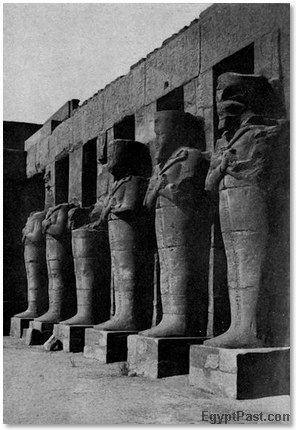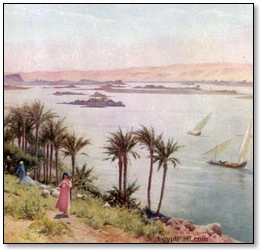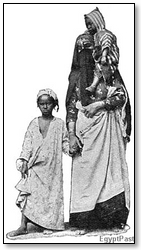THE EGYPTIANS

The Guardians
People.— The origin of the Egyptians is unknown. It is certain that the Egyptian civilization goes back many thousansds of years, and many centuries before the first recorded history. Ethnologists have attempted to establish a relationship with the peoples of the south, any differences being accounted for by variations of environment. Philologists have looked to the east for their next of kin as regards descent as well as speech. It has also been thought by some that an eastern origin is indicated by the fact that the Egyptian oriented himself by looking toward the south, but this is rather due to the direction of the Nile.
Between the results thus reached there is an evident conflict, with no obvious means of harmonizing them. It has been suggested that the facts can best be reconciled upon the theory, not of a migration of a whole people, but of an incursion of a smaller band who succeeded in establishing their rule over the original people and in gradually forcing their own language, as that of a ruling class, upon those whom they had subjugated, while still the ancient ethnological type persisted. This theory is merely a working hypothesis, and it has reference to a time long anterior to any historical monuments or traditions, for long before the earliest extant inscription Egypt was a united country under the rule of native kings, and possessed of a well and independently developed government and of well-defined classes of society.
A national name for the people as such never seems to have existed. Among themselves they were romet, "men" (humans), par excellence; all others were inferior races in the eyes of the Egyptians. National pride and chauvenism caused the Egyptians to refer to neighbouring civilizations as " miserable" Cushites, Libyans, Asiatics, Shasu. The Egyptians considered themselves were the wards of the great gods, and that Pharaoh was descended from the sun god Ra, who had himself once ruled in Egypt. Other peoples were descended from the enemies of their deities, and when Ra had overthrown them at Edfu a portion escaped; those southward became Ethiopians, northward Asiatics, westward Libyans, eastward Beduin.

Life Along the Nile
National Character
Personal experience has warped the judgment of observers on this point. Herodotus praises the cleverness of the Egyptians and their excellence of memory; Diodorus declares them to be the most grateful of people; the Emperor Hadrian characterizes them as "thoroughly frivolous, unstable, following every rumor, refractory, idle, and libelous." The modern notion is that they were so occupied with the thoughts of the future as to be oblivious to the present. There is undoubtedly a degree of truth in all of these estimates, but a broader survey shows that they were energetic in their undertakings, as is evidenced by their temples and the pyramids, still the wonder of the world; possessed of sufficient skill to perform by force of numbers labors which would test modern mechanics severely ; practical in their methods of utilizing the forces of nature; peaceable as over against other nations, and little given to love of novelty; artistic in their execution and accurate in their observation; a people given to realism; unversed in literary arts; devoted to agricultural pursuits; developed within narrow limits, and little affected by external and foreign influences.

Egyptian Mother and Her Children
Social Classes
Classes.—The monuments are fuller than the enumerations of Herodotus and Diodorus, who name seven and five classes of people respectively. Herodotus gives priests, warriors, cow-herds, swine-herds, tradesmen, interpreters, and boatmen; Diodorus, priests, warriors, husbandmen, shepherds, and artisans. All these existed, but the enumeration is defective. True caste was unknown. The population was divided into two great parts -- nobles and slaves -- while the middle class has left its traces from the Middle Kingdom onward. The upper class included royalty and those in the service of state or religion, a ruling class, far removed from the slave population, foreign and native. They formed the backbone of the state, filled all the higher offices, and were obeyed by all their social inferiors. At the head of the government stood PHARAOH (q. v.; Egyptian, Per-aa, meaning "great house"), the "King of Upper and Lower Egypt, son of Re, eternal."
pyramids Egypt Mummies Search Engines Link Report
Egyptian Cities | Egyptian Education | Ancient Egypt | egyptian clothing | Egyptian Houses | The Egyptians | Egyptian Family Life | Egypt and its Neighbours | Government in Ancient Egypt | Egyptian History | Military | Organization of Ancient Egypt | Recreation | Egyptian Religion | Pyramids | About | Privacy Policy | Site News | Site Map
EgyptPast.com - Facts and Information About the History of Ancient Egypt
-